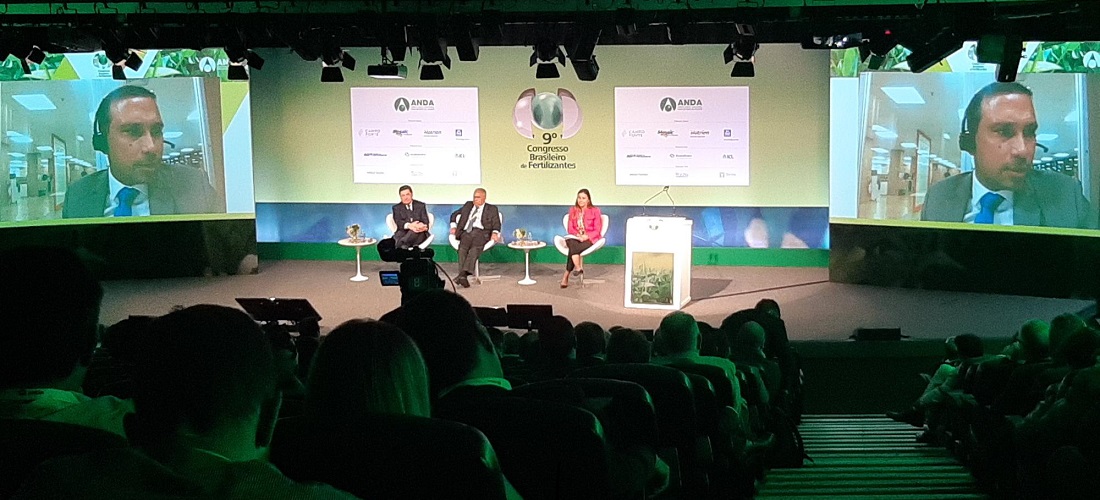
Fertilizers: Brazil’s investment to fight scarcity
Aug, 23, 2022 Posted by Gabriel MalheirosWeek 202234
On Tuesday, August 23, the DatamarNews team participated in the 9th edition of the Brazilian Fertilizer Congress organized by Anda, the Brazilian National Fertilizers Association.
The event addressed the main difficulties faced by national producers concerning access to fertilizer at a time of global logistics chaos caused by the Covid-19 pandemic and Russia’s invasion of Ukraine. Nearly 80% of all fertilizers used in Brazil are imported. Much of this comes from Russia.
DataLiner data show that, in the period from January to June 2022, the leading fertilizer suppliers to Brazil were: Russia (18%), China (10%), Canada (8%), the United States (8%), Spain ( 5%) Morocco, Israel, and Egypt, with 4% each.
Food insecurity
The pandemic, war, and lack of energy supplies are among the leading causes of food insecurity affecting the whole world, especially developing countries.
Brazil, as the world’s fourth largest global food producer, only trailing behind China, the United States and India, plays an important role in the global supply of food, exporting a large part of its produce, which makes access to fertilizers essential.
According to the Minister of Agriculture, Marcos Pontes, who served as the keynote speaker for the event, the restrictions imposed by Western countries on Russia forced Brazil to take several actions to secure to avoid scarcity of the product, such as the so-called Fertilizer Diplomacy adopted by the Ministry of Agriculture in partnership with Russia. Another example is Brazil’s National Fertilizer Plan, launched in May, which aims to reduce external dependence on various types of fertilizers in the medium and long term from 85% to about 50%.
See below the track record of Brazilian imports of fertilizers from Russia and Canada. The data is from DataLiner:
Fertilizers from Canada and Russia to Brazil | Jan 2021 – Jun 2022 | WTMT
Source: DataLiner (click here to request a demo)
The lack of agricultural inputs and food items is such a grave threat to food security that, on August 20, the UN Secretary-General, Antonio Guterres, stated that fertilizers, as well as Russian agricultural exports, must be able to reach world markets “unimpeded,” despite Western sanctions.
“It is important that all governments and the private sector cooperate to bring them to market,” he said from the Joint Coordination Center (JCC), which oversees the implementation of the Ukrainian grain export agreement signed in July by Kyiv and Moscow, with the United Nations and Turkey as guarantors.
Infrastructure
Another topic addressed at the conference was the logistical infrastructure necessary for receiving these inputs. Despite the pandemic, the port sector showed where it stands in contributing to the Brazilian economy, according to the director of the Department of Port Management and Modernization – SNPTA of the Ministry of Infrastructure, Otto Luiz Burlier.
In his opinion, in addition to investments in infrastructure, Brazil is focused on improving processes and deploying logistics intelligence projects to enhance the quality of services, such as Porto sem Papel (paperless port, an initiative aimed at aiding ports to become more digitally connected).
Sérgio Sukadolnick, vice president of the Brazilian Association of Transport and Logistics of Dangerous Products ABTLP/Grupo Cesari, emphasized some logistical challenges for receiving these inputs and transporting grain production, such as a lack of risk management in transportation, terminal deficiencies, and a lack of storage space, as well as bureaucracy, which has an impact on productivity, taxes, and high logistics costs in Brazil.
According to him, while in OECD countries and the United States, the logistics cost corresponds to 10% of the value of fertilizers in the market, in Brazil it accounts for about 25 to 30% of the final cost. In addition, there is a lack of investment in railways, such as the integration of the rail network, investment in river transport, and dredging ports to ensure the country’s competitiveness.
Another point discussed at the event was the national production of fertilizers.
It is worth noting that DatamarNews was one of the event’s media partners.
-
Meat
Oct, 24, 2022
0
Lower cattle prices to fatten Brazilian meatpackers’ margins, analysts say
-
Shipping
Jul, 01, 2019
0
HMM to join The Alliance
-
Grains
Mar, 16, 2020
0
AgRural reduces soybean forecast for 19/20 crop due to drought in Rio Grande do Sul
-
Economy
Jul, 01, 2020
0
Trade surplus hits a record in June due to significant drop in imports

